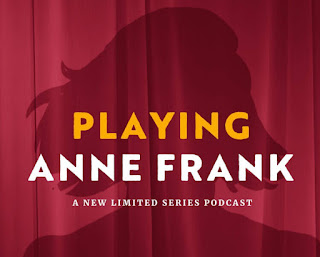The Diary of a Young Girl, also known as The Diary of Anne Frank, is a book of the writings from the Dutch-language diary kept by Anne Frank while she was in hiding for two years with her family during the Nazi occupation of the Netherlands. The family was apprehended in 1944, and Anne Frank died of typhus in the Bergen-Belsen concentration camp in 1945 at the age of 16.
The book, the Broadway play, and the movie have achieved iconic status as an early warning system to the evils of fascism and the resulting genocidal tragedy.
A new podcast, Playing Anne Frank, will be released on January 24. Using archival material and interviews with surviving cast and crew members, executive editor of the Jewish weekly publication, Forward, Adam Langer presents a story that’s never been told: the backstory of "The Diary of Anne Frank," the Pulitzer Prize-winning play and Oscar-winning film, and how this iconic work shapes those involved in performing it — including high school students putting the show on today.
It seems that this is an ideal time for the story of Anne Frank to be retold. First, extremists in Texas have made several attempts to ban the book, The Diary of Anne Frank, in several areas of the state. Other states have followed suit.
Second, the term “bothsidesism” has gained considerable momentum in the last few years. It describes the phenomenon of treating every opinion as equally valid, including falsehoods masquerading as objective fact. In October 2021, for example, educators in Southlake, Texas, were told if they had a book on the Holocaust in their classroom library, they would also have to have one that with an “opposing” perspective. In January 2022, Republican State Senator Scott Baldwin of Indiana said that educators “need to be impartial” while teaching students about Nazism.
In June 2022, at the American Library Association’s annual conference, author Nancy Pearl suggested that Holocaust denial books had a place in school libraries.
Clearly, these people need to be reminded of the tragedy of Anne Frank, her courage, and the inspiration we can draw from her ordeal.
The Diary of Anne Frank, which debuted on Broadway in 1955 and then later toured the country, was one of the most influential plays of the 20th century, and a life-changing experience for many of those who saw it. It introduced millions of Americans to the Holocaust and its victims. But what did reenacting Anne’s story mean to the people who created and acted in the play or the 1959 film? How did dramatizing her life affect their lives and careers? Who were they?
In seven episodes, Playing Anne Frank weaves together stories of art and culture and, ultimately, deep humanity.
You can listen to the trailer here.
The podcast features original music by Emmy award-winning composer Sila Shaman, performed by Shaman and Grammy-nominated musician Anat Cohen.
Adam Langer conceived, reported, wrote, directed and hosts the podcast. He is the executive editor of the Forward and the author of a memoir and five novels, including Cyclorama, published in 2022, which traces the lives of the actors in a 1980s high school production of The Diary of Anne Frank in suburban Chicago.
You’ll hear from Millie Perkins, who played Anne in the movie, and Eva Rubinstein, who originated the role of Margot Frank on Broadway, then left the theater to become a world-famous photographer. You’ll eavesdrop on the reunion of Pauline Hahn and Steve Press, who performed more than 100 shows together as Anne Frank and Peter Van Daan, but haven’t seen each other in 60 years.
Founded in 1897 as a Yiddish-language daily, the Forward soon became a national paper, the most widely read Jewish newspaper anywhere. By the 1920s, its circulation outstripped The New York Times. It chronicled the events that affected a population of immigrants eager to earn their place in American life, and published regional editions around the country before any other newspaper.
The English Forward was launched as a weekly in 1990. Its
perspective on world and national news, and its unparalleled coverage of
Jewish arts culture and opinion, have made it the most influential
nationwide Jewish media outlet today.
Their answer, outlined in a new book called "The Betrayal of Anne Frank A Cold Case Investigation," by Canadian academic and author Rosemary Sullivan, is that it could have been a prominent Jewish notary called Arnold van den Bergh, who disclosed the secret annex hiding place of the Frank family to German occupiers to save his own family from deportation and murder in Nazi concentration camps.
In today's world with the January 6th insurrection, the attempt to overthrow the German government several months ago, and the recent attacks in Brazil, we need a reminder of how democracy protects us from the worst instincts of racial supremacists, extremists, and those who blame certain races and religions for their own woes.On January 24, download Playing Anne Frank and listen to a story that’s never been told: the backstory of "The Diary of Anne Frank," the Pulitzer Prize-winning play and Oscar-winning film, and how this iconic work shapes those involved in performing it — including high school students putting the show on today.
Here is a quote from Anne Frank's diary. Remember, it's a teenager who is hiding with her family from people who want to kill them.
“Everyone has inside of him a piece of good news. The good news is that
you don’t know how great you can be! How much you can love! What you can
accomplish! And what your potential is!”

Comments
Post a Comment
Thank You for your input and feedback. If you requested a response, we will do so as soon as possible.